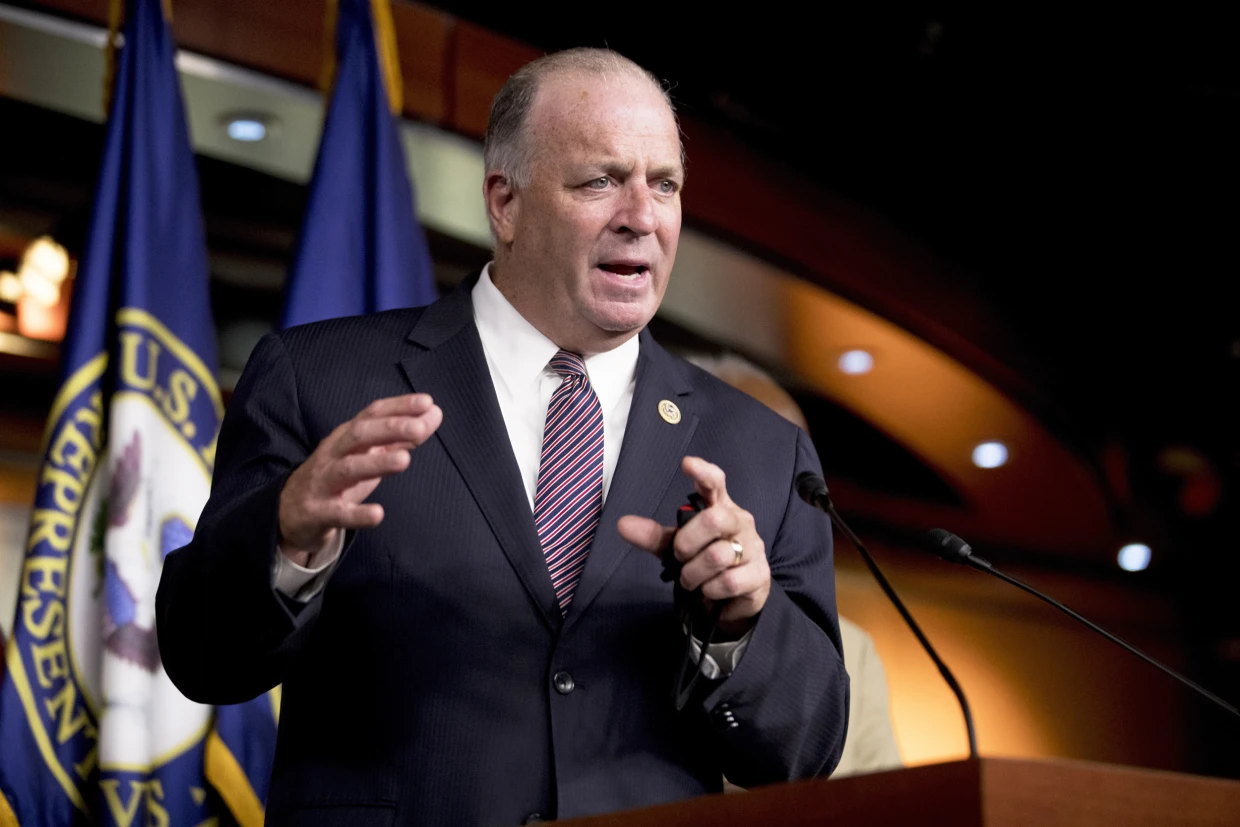So far, more Democrats in competitive races have announced their retirements than Republicans.
WASHINGTON — Members of Congress have headed home for the holidays — and some will come back having decided they don’t want to re-up for more terms in the nation’s capital, buffeting an already volatile fight for control of the House next year.
Retirement announcements often come after the holidays, as lawmakers discuss their next steps with their families and weigh whether to continue in an increasingly dysfunctional Congress. And because Democrats need a net gain of just five seats to take control of the House in 2024, every seat is going to matter, and the dynamics can shift if a race suddenly becomes an open contest.
So far, 35 House members — 23 Democrats and 12 Republicans — have announced they are retiring or leaving the chamber to run for other offices, according to the House press gallery. That’s still behind the 49 House members who decided not to run for re-election in the midterms in 2022, a redistricting year, but it’s only one shy of the 36 who bailed before the 2020 election, with time to add more to the list.
More Democratic lawmakers in competitive districts have retired, resulting in seven open seats that the Cook Political Report with Amy Walter rates as in play.
They include the seats of Reps. Dan Kildee and Elissa Slotkin of Michigan, a Senate candidate, whose exits come in “tossup” races. Reps. Katie Porter of California, who is running for the Senate, and Abigail Spanberger of Virginia, who is running for governor in 2025, are also leaving open seats that are considered competitive.
The partisan split, with more vulnerable Democrats retiring, is partly due to the current makeup of the House. Many vulnerable Republicans are first-term lawmakers who are less inclined to leave Congress after they were just elected.
Republicans, including the House GOP’s campaign arm, believe Democratic retirements could give them an edge next year.
“The political blast radius from congressional retirements has almost entirely blown back on House Democrats,” said Jack Pandol, a spokesman for the National Republican Congressional Committee. “These open swing seats are tilting the House battlefield, putting Democrats on defense from coast to coast as their incumbency advantages evaporate into thin air.”
But Democrats aren’t panicking.
“As the reason for the least productive Congress since the Great Depression, it says a lot that when House Republicans run for the retirement exits, they’re trashing their own party on the way out,” said Viet Shelton, a spokesman for the Democratic Congressional Campaign Committee.
“It’s against this backdrop of dysfunction and Republican infighting that the public will be voting and why, in races to fill competitive open seats, we’re confident voters will choose Democrats’ responsible governance over the extreme MAGA acolytes that Republicans are nominating across the battleground,” Shelton added.
Still, losing incumbents does shift the dynamics in those competitive House races. Incumbents often start with advantages in name recognition and fundraising, while open seats can lead to divisive and costly primaries.
House Democrats’ fundraising advantages, especially, have boosted the party in recent election cycles, as they swamped their GOP opponents in cash. And some of those top fundraisers are opting to run for higher office next year, including Porter, who spent $28.8 million in her House race last year. She defeated Republican Scott Baugh, who spent $3.1 million, by 3 points.
Slotkin’s House race was among the country’s most expensive last year, and she outspent her opponent, Republican Tom Barrett, by more than four times: $11.4 million to $2.8 million. Spanberger spent more than twice as much on her 2022 re-election race as her GOP opponent, Yesli Vega.
Given such advantages, party leaders may be pressing formidable incumbents to stick around.
“You want to keep steady hands around here, so you appeal to their sense of duty,” Rep. Tom Cole, R-Okla., a former NRCC chairman, said in a brief interview at the Capitol this month.
Cole said he was concerned that recent chaos in the House — including a historic string of votes to elect Kevin McCarthy of California as speaker at the beginning of the year and then his ouster several months later, as well divided government and polarization — could send more lawmakers heading for the exits.
“You can see why members get frustrated,” Cole said. “The people that cut the deals are the ones that get vilified.”
While Cole noted that retirements so far could benefit Republicans, he said the fight for the House will still be close, especially with the presidential race affecting the down-ballot dynamics.
“It’s still a game of inches,” he said.
Kildee, the six-term Michigan Democrat who announced his retirement last month, said in a brief interview off the House floor that “everybody I know” tried to persuade him to run for another term. Republicans view his 8th District as a top pickup opportunity, given that President Joe Biden carried the district by just 2 points in 2020, according to calculations from Daily Kos Elections.
The prospect of leaving open a competitive seat did affect Kildee’s decision to run again last year, but his 10-point victory convinced him that Democrats could hold his district.
“I feel fairly confident,” Kildee said. “We’re going to have a great candidate, I know that, because we’ve got great people running.”
Ongoing redistricting battles have also shaken up the House map and could lead to more retirements next year. Three House Democrats in North Carolina have already forgone runs for re-election after a GOP-led redrawing of the map made their districts more Republican-leaning. New maps coming from Democrats in New York could affect a number of Republican incumbents there.
But other members facing potentially new districts say they’re running no matter what, including GOP Rep. Garret Graves of Louisiana, whose district could become more competitive under a new court-ordered map.
“I’m running for re-election. I’m running for [Transportation and Infrastructure Committee] chair. And anything that happens in regard to redistricting is depending on the courts,” Graves said as he left the House floor this month.
Aside from redistricting battles, it’s not clear which members in competitive seats could still be eyeing the exits. Campaign strategists involved in House races in both parties hesitated to name many names, noting many incumbents in competitive seats have signaled they’re running by posting strong fundraising figures.
Some strategists mentioned Rep. Marcy Kaptur, D-Ohio, who was first elected in 1982, as a lawmaker who could opt not to run again. She is one of just five House Democrats representing districts former President Donald Trump won in 2020, and her district became much more GOP-leaning last year when the state’s congressional map was redrawn.
But last week, Kaptur filed to run for a 22nd term, and she could face a rematch against Republican J.R. Majewski, whom she defeated by 13 points last year.
Of course, there’s always room for a few surprises. But still, Democrats aren’t very worried that more retirements could dampen their efforts to flip the House.
“I feel the momentum heading into 2024,” said Rep. Haley Stevens, D-Mich., a co-chair of the DCCC’s Frontline program for vulnerable incumbents.
“Frankly, we’ve got some amazing candidates who are running across the country,” she later added. “But we also have some incredible incumbents, particularly in Frontline districts, who are raising good money, communicating their values, their name ID is strong in their district. And frankly, the Republican dysfunction here in the House has been turning off voters.”




